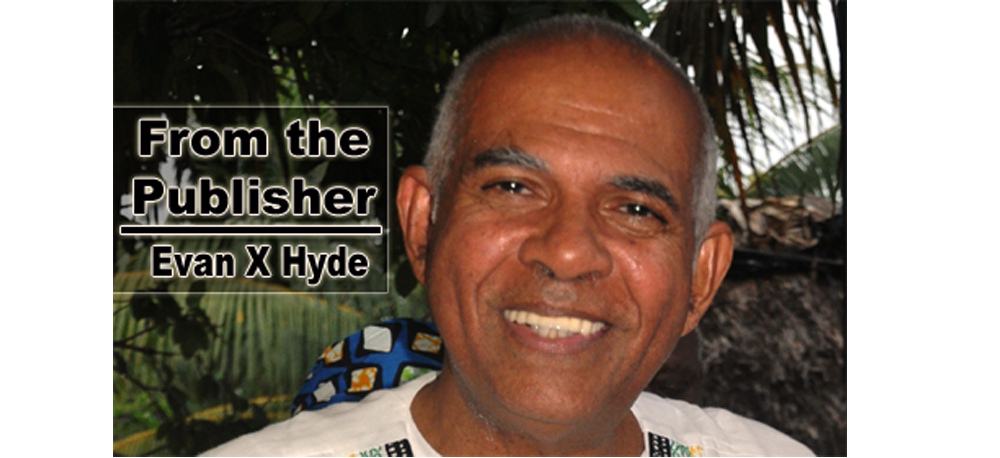When you write in the attempt to convince someone of something, I believe such writing is described as “polemic” in nature. Since local scholars began opining two or three decades ago that Belize’s two major political parties—the PUP and the UDP—are pretty much the same thing, there has been less polemic writing around, except in the political party newspapers.
The first thing I wrote after I returned from school in mid-1968 was a booklet entitled Knocking Our Own Ting. The subject was the 1798 Battle of St. George’s Caye and the various opinions on, and interpretations thereof.
In the winter of 1967, I had been influenced by the reading of Malcolm X’s autobiography. His portrayal of West Indian Archie, a numbers (illegal lottery) runner who could not be convicted by the police because he kept all the numbers in his computer-like brain, impressed me. West Indian Archie was brilliant, but he was not formally educated. There were people like that in the streets around Bolton Bridge (Regent Street West and West Canal) where I grew up.
When I attended Holy Redeemer Boys (Primary) School from 1952 to 1959, the teachers would often reprimand students to the effect that if they did not study their lessons, they would end up cleaning the city drains. This appeared to be the worst fate imaginable.
The primary schools in British Honduras when I was growing up were all run by the Christian denominations — Roman Catholic, Anglican, Methodist, Baptist, Nazarene, and so on. The emphasis of these schools was, as a result, on religious teaching and, to a lesser extent, on liberal arts subjects.
The thing I have learned about the brain is that there are all kinds of brains, which is perhaps why some people say common sense is better than education. Some educated people are not very practical, whereas some uneducated people are brilliant in different ways. Such was West Indian Archie.
The late, eminent British historian, Peter Ashdown, to whom I am grateful for his work on twentieth century Belize (British Honduras), did not rate Knocking Our Own Ting highly. My pride was, of course, hurt, but after I thought about it somewhat, I felt perhaps he had missed the booklet’s main point, which is that the majority of black people in the settlement of Belize in 1798 would have hedged their bets when the Spanish armada from the Yucatan came attacking Belize in September of 1798. Black people’s loyalty to the settlers and the British would not have been unconditional, because black people in the settlement had a history of fleeing to the Yucatan in Mexico and to the Peten in Guatemala. The King of Spain had promised them freedom if they accepted Catholicism.
Between 1798 and 1810, when a massive rebellion against Spain was led by the Mexican priest, Hidalgo, Napoleon Bonaparte, the emperor of France, had taken control of Europe, and had placed two of his brothers on the thrones of Spain and Italy. There was talk that Napoleon would cross the Channel and invade England, but instead Bonaparte went east to invade Russia. where he met disaster.
The Haitian, Toussaint L’Ouverture, controlled the whole of Hispaniola (Haiti and the Dominican Republic) in 1798. He had defeated French, British, and Spanish armies.
In fact, the King of Spain had sent Haitians who were loyal to him for refuge in places like Florida, Yucatan, and even Spain itself. The King of Spain had sent more than a hundred Haitians to live on the north coast of the Yucatan in 1796, and since the military, as Professor Matthew Restall points out, had been an avenue for upward mobility for blacks in Yucatan society from the sixteenth century onwards, one would suspect that the Haitians, known as superior warriors, would have been recruited for O’Neill’s Yucatan armada of 1798.
In any case, it is notable that the power structure in Belize did not celebrate the 1798 battle until 1898, a full one hundred years later, and in so doing wiped out the 1888 celebration of 1838’s Emancipation Day which people like Simon Lamb had organized.
We have had a complex situation in Belizean society from way back, because the British settlers had established at least four color classes—white, free colored, free black, and slave black. No one is sure when the “raise yu color” thinking became powerful here, but our generation grew up meeting that, and often it seems as if that thinking is still around.
As part of the hype surrounding September celebrations, there are Belizeans who say that there were people, including blacks, who paddled from Flowers Bank to break the June 1797 tie about whether to remain and defend Belize, or to abandon it. When I wrote Knocking Our Own Ting in 1969, I had never heard of this. The first time I ever heard of this incident was from Emory King, who was a very creative guy and confessed that he was not a historian. But if you want to believe the late Emory, bully for you. Personally, I am somewhat skeptical.
If all that supposedly occurred, didn’t occur, some people say that we Belizeans would be talking Spanish instead of English. Personally again, I prefer speaking English to Spanish, which I’m not good at, so, to return to the central issue of 2024, this ICJ issue troubles me. If 1798 was so dramatic and decisive, what’s up with the questioning of our borders?

